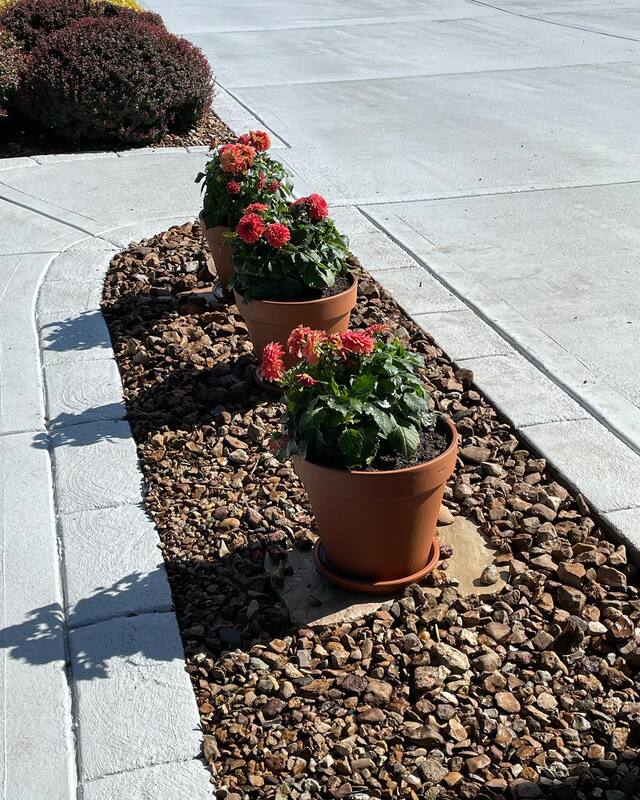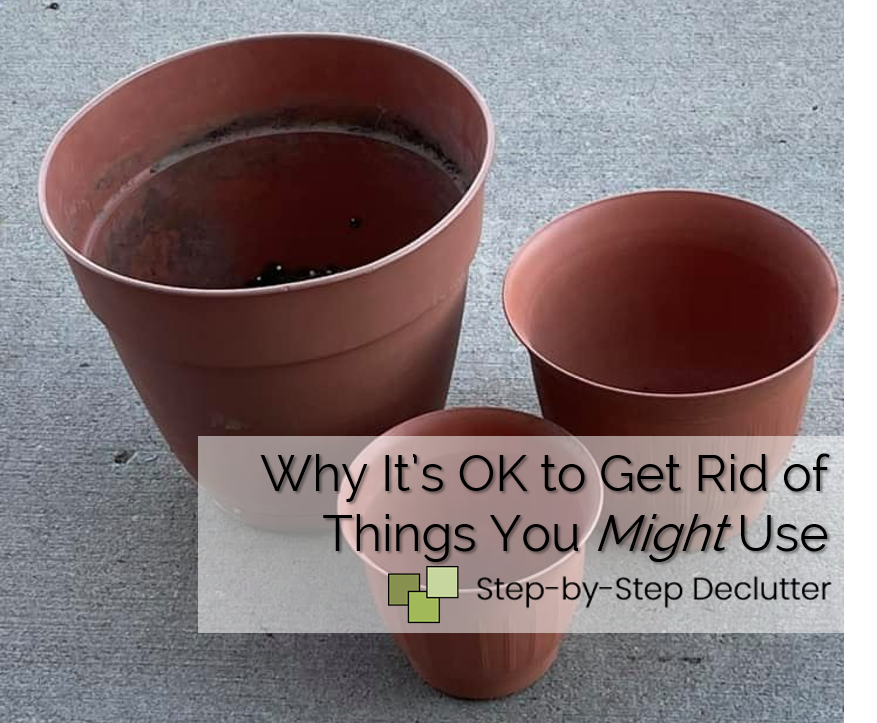|
|
|
It has been six months since we moved into our new home. In that time, my husband has pointed out to me on three occasions a decluttering version of "I told you so". After discovering a use for something I chose to get rid of, he has essentially said, "This is why you don't get rid of things you might use." I adore my husband, but I respectfully disagree. In all three cases, I am content with my choice even though it meant replacing each of the items in question. Lest you think I'm a lunatic, I will endeavor to explain.
Ten years ago our youngest son did an experiment in bouyancy for his fifth grade science project. It required approximately 40 ping pong balls which we have retained in our possession ever since (until our recent move). We do not own a ping pong table or have access to one. At one point several years ago I made a vain attempt to repurpose the ping pong balls after seeing an idea on Pinterest. This involved writing tasks/activities on each ball. My son was not nearly as impressed with the idea as I was, and the ping pong balls soon found their way back to the garage. Thus, I felt completely justified in tossing them out when it came time to move. As luck would have it, mere weeks after discarding the ping pong balls, my husband was put in charge of securing supplies for a church youth activity. They planned to play a series of Minute to Win It games, one of which required...ping pong balls. Here's why I do not regret my decision to toss out those ping pong balls:
A couple of years ago we created a cement patio in our back yard. In preparation for the project, we pulled up eight square red brick pavers which have been sitting in our shop ever since. In preparation for the move, I offered them up on Facebook, and they were quickly claimed by a friend. She had the perfect spot for them. They actually solved a problem she'd been battling in her yard, and she was thrilled to get them. Several of the flower beds in our new house are filled with rock. One such bed is a narrow strip between the driveway and the front walk. A couple of weeks ago we decided to space flower pots in the rock to add some color and interest to the area. We decided it would be useful to put down pavers underneath the pots so they would sit flat. Again, my husband pointed out that we were buying something we had only recently given away, but I was completely comfortable defending that decision. Here's why:
We moved in December, and I honestly wasn't thinking much about spring and planting flowers. I was thinking about downsizing. In my zeal to lighten our load, I gave away six or eight mismatched plastic flower pots in varying sizes. All of them were sun faded and some of them were a little cracked around the rim. Now it's May, and I'm busily striving to beautify my new yard and increase my home's curb appeal (see the above entry for details). As we drove to Home Depot to shop for flower pots, my husband jokingly said, "It's too bad we didn't have a bunch of flower pots lying around that we could have used." Haha. I know. I know. Once again, I was unphased by the fact that we were replacing something we had recently owned and given away, and this is why:
Might is a word I hear often as an organizer. "I can't get rid of that because it might come in handy." Or "You never know when you might need a...." Other related words include ought, should, and could. All of these words convey a sense of uncertainty coupled with a vague notion of obligation. Most people, if questioned, would no doubt indicate an unwillingness to let fear serve as a primary motivator for their decisions and behavior. Yet many of us do just that when we succumb to the influence of 'might'. In essence, we let our belongings bully us. We keep things that serve no apparent or meaningful purpose in our lives - things we have no emotional attachment to or conceivable use for - simply because they might be needed. Instead of sacrificing precious space for things that may or may not prove useful at some future date, why not make space for the things you have a use for and interest in right now?
A client recently complained to me that "organizers always say that holding onto things you might need is pointless because you never use them." I admit, I'm guilty as charged. This person went on to express her amazement at how many times she has been saved at the last minute because she held onto something she needed. This well-meaning individual failed to see the flaw in her reasoning, which is this: there is a difference between an actual need/use and a hypothetical one. In her case, she was actually using the things she had chosen to keep. The problem arises when we aren't sure when or if an item will prove useful. If you can visualize a legitimate use for something, by all means, hold onto that item. If, however, you only have an ambiguous notion that it could serve some purpose someday - but no real notion of what that purpose could be - please consider getting rid of the item.
When trying to determine which of your 'mights' are legitimate and which are simply nebulous, I recommend doing a cost comparison. There are many different costs associated with keeping vs. replacing an item. Consider the following:
When it comes down to it, there are a couple of questions we should ask ourselves when considering whether or not to keep the 'mights' in our lives:
There is no wrong answer to these questions. Only you can decide what a particular thing is worth to you, but I encourage you to take the time to think it through. If you decide you value other intangibles over the item, you can feel confident letting it go, even if a use actually does arise in the future. I hope that I have demonstrated through my personal experiences that discovering you could have used something you got rid of doesn't have to be devastating. In fact, it can be validating. In each of the cases I shared, I discovered that what I had wasn't really what I wanted. While the items in question could have been used to satisfy my purposes, I would not have been as happy with the results.
10 Comments
6/14/2021 11:11:42 am
I am with you! Getting rid of stuff is OK. Sometimes we need them later, but the majority of the time, we do not. Plus, items that are left about not in use still do decay and breakdown. And, when you need them, you may not be able to use them. I find that the people who keep the items "just in case" find out, later when I work with them, they did not use them at all and it took up valuable space they could have used or freed up.
Reply
6/14/2021 01:49:50 pm
So true, Sabrina! I recently had that experience moving my mom to a retirement home. We had gone through a couple of years earlier and cleaned out her pantry and kitchen. When it came time to move her there was so much stuff that she opted to keep that we ended up getting rid of - partly due to a need to downsize, but in many case due to the fact that stuff had long expired or just never gotten used in the interim.
Reply
6/14/2021 11:37:31 am
Great advice here! Giving items to people who need them has multiple benefits. Less clutter, and more human connection!
Reply
6/14/2021 01:52:04 pm
Yes! I totally agree. I have become a big fan of offering things up to friends on Facebook. We did that a bunch during our move, and every single item got claimed with people often saying how excited they were to get the item being offered. In some cases I was able to reconnect with people I hadn't seen for months because of COVID-19 and in some cases I was able to meet new members of my church congregation. It was a very satisfying experience.
Reply
6/14/2021 11:54:09 am
I hear this comment every now and then. "See, I told you it was worth keeping." I think people feel justified that they did find a use for things. I completely agree with everything you have said here. For every one item you may find a way to use, there are many that you never would use.
Reply
6/14/2021 01:53:33 pm
Thanks, Seana! It made my day to read that the ping pong balls made you laugh! I appreciate your comment!
Reply
6/14/2021 02:27:42 pm
Great examples - I tell my clients that if you get rid of 50 items and then need to go back and replace 2 or 3 of them you are way ahead!
Reply
6/14/2021 02:50:52 pm
That's an excellent example! I like that way of looking at it. I may use that logic myself.
Reply
6/14/2021 11:59:52 pm
You can always replace something. I have yet to come across an item that is irreplaceable during a decluttering session. My one-of-a-kind items tend to be known immediately and are kept safe. Others, I try to encourage releasing them to someone who can use them.
Reply
6/15/2021 06:55:08 am
You bring up an excellent point. We know one-of-a-kind items when we see them. The things we stress and fret over parting with are often inconsequential in terms of their true value in our lives. It’s because we think they might have value that we feel the need to hold onto them.
Reply
Leave a Reply. |
Archives
November 2022
Categories
All
|
Proudly powered by Weebly




 RSS Feed
RSS Feed